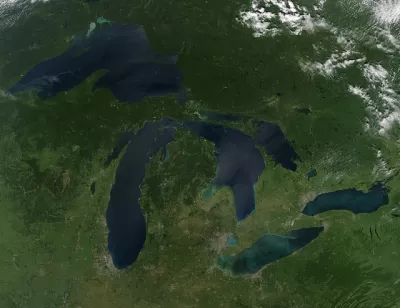The city of Waukesha will be able to pump water from the Great Lakes to replace its contaminated local ground water supply. It's the first community outside the Great lakes watershed allowed to divert water under terms of the Great Lakes Compact.

"A suburban Milwaukee city won a hard-fought battle Tuesday to draw its drinking water from Lake Michigan," reports the Chicago Tribune news service. The decision is "a key test of a regional compact designed to safeguard the Great Lakes region's abundant but vulnerable fresh water supply," according to the article.
Waukesha was the first city to make use of a provision in the 2008 Great Lakes Compact that allows communities just outside the Great lakes watershed to request diversions of water outside the watershed. Waukesha proposed the $207 million diversion project after discovering that "groundwater wells on which the city has long relied are contaminated with radium." Waukesha will now be allowed to pump 8.2 million gallons of water a day from Lake Michigan.
According to a separate article by Dan Kraker:
A panel of representatives from the eight Great Lakes states (plus two Canadian provinces) gave the plan tentative approval in May. But it required Waukesha to reduce the amount of water it would withdraw daily from 10.1 million gallons to 8.2 million gallons, and to shrink the size of the area it would provide with water to 57 percent of the original proposal.
The controversial proposal attracted plenty of opposition over the years, including when Planetizen first picked it up in January 2011. In September 2015, several local newspapers raised concerns about the end of the project's trail, when Waukesha will pumps treated wastewater back into Lake Michigan. As recently as May, the decision to cut the daily volume and delivery area of the project prompted a discussion about growth in the suburban area of Waukesha.
FULL STORY: Wisconsin city allowed unprecedented access to Lake Michigan for drinking water

Alabama: Trump Terminates Settlements for Black Communities Harmed By Raw Sewage
Trump deemed the landmark civil rights agreement “illegal DEI and environmental justice policy.”

Study: Maui’s Plan to Convert Vacation Rentals to Long-Term Housing Could Cause Nearly $1 Billion Economic Loss
The plan would reduce visitor accommodation by 25% resulting in 1,900 jobs lost.

Planetizen Federal Action Tracker
A weekly monitor of how Trump’s orders and actions are impacting planners and planning in America.

Wind Energy on the Rise Despite Federal Policy Reversal
The Trump administration is revoking federal support for renewable energy, but demand for new projects continues unabated.

Passengers Flock to Caltrain After Electrification
The new electric trains are running faster and more reliably, leading to strong ridership growth on the Bay Area rail system.

Texas Churches Rally Behind ‘Yes in God’s Back Yard’ Legislation
Religious leaders want the state to reduce zoning regulations to streamline leasing church-owned land to housing developers.
Urban Design for Planners 1: Software Tools
This six-course series explores essential urban design concepts using open source software and equips planners with the tools they need to participate fully in the urban design process.
Planning for Universal Design
Learn the tools for implementing Universal Design in planning regulations.
Caltrans
Smith Gee Studio
Institute for Housing and Urban Development Studies (IHS)
City of Grandview
Harvard GSD Executive Education
Toledo-Lucas County Plan Commissions
Salt Lake City
NYU Wagner Graduate School of Public Service





























